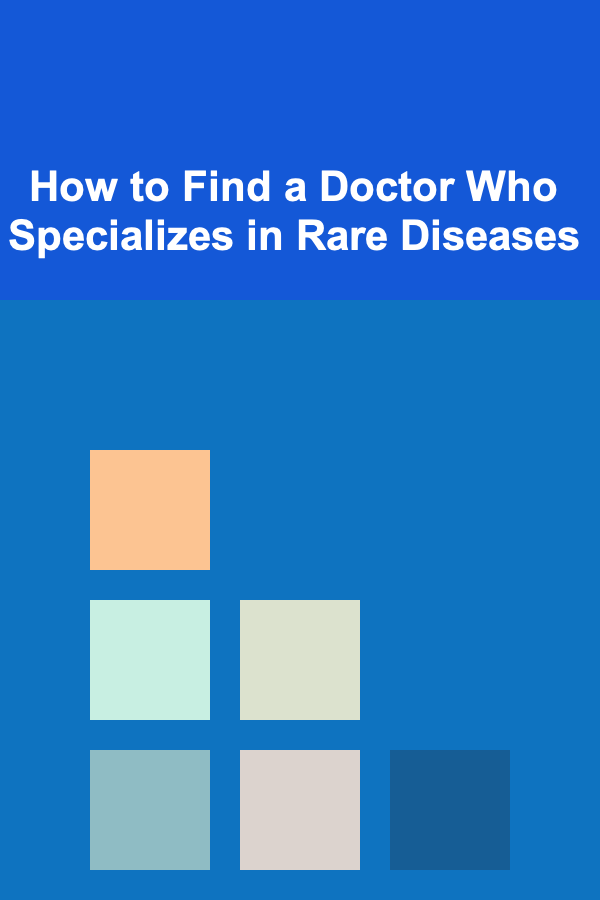
How to Find a Doctor Who Specializes in Rare Diseases
ebook include PDF & Audio bundle (Micro Guide)
$12.99$9.99
Limited Time Offer! Order within the next:

Finding a doctor who specializes in rare diseases can be a complex and challenging task. Rare diseases, often referred to as orphan diseases, are conditions that affect a small percentage of the population. Despite the name, these diseases are not necessarily rare in terms of their impact on individual lives, as thousands of such diseases exist, affecting millions worldwide. However, the lack of awareness, limited research, and the small number of specialists make it difficult for patients and their families to navigate the healthcare system.
This article will guide you through the process of finding a doctor who specializes in rare diseases, exploring various methods, resources, and considerations that can help you ensure the best possible care for your condition.
Understanding Rare Diseases
What Constitutes a Rare Disease?
A rare disease is typically defined as a condition that affects fewer than 200,000 people in the United States, although this number varies depending on the country. Some well-known rare diseases include conditions like:
- Huntington's Disease
- Cystic Fibrosis
- Duchenne Muscular Dystrophy
- Fibrodysplasia Ossificans Progressiva (FOP)
- Rett Syndrome
- Certain types of cancer such as mesothelioma or sarcoma
Rare diseases often come with challenges, including a lack of awareness among healthcare providers, difficulty in diagnosis, and limited treatment options. This is why it is crucial to find a specialist who is not only familiar with the disease but also has the expertise to provide treatment and ongoing care.
Why Do Specialized Doctors Matter?
Rare diseases require expertise beyond what a general practitioner can offer. Specialists who are familiar with the complexities of rare diseases are essential for:
- Accurate diagnosis: Many rare diseases present with symptoms similar to more common conditions, making it difficult to diagnose without specialized knowledge.
- Targeted treatment: Treatment for rare diseases can be vastly different from more common conditions and often requires unique approaches.
- Research and clinical trials: Many rare disease specialists are involved in ongoing research, offering patients access to new treatments, clinical trials, and therapies that might not be widely available.
Start with Your Primary Care Physician
If you have a rare disease or suspect that you might, the first step is often to consult your primary care physician (PCP). Your PCP can be an essential part of the journey for several reasons:
- Referral to Specialists: PCPs have access to a network of specialists and can guide you toward doctors who have experience with rare diseases. They can provide valuable referrals to top specialists or institutions that have the resources to handle complex cases.
- Initial Diagnosis: Your primary care physician can run initial tests to rule out other common conditions and identify possible signs of a rare disease.
- Coordinating Care: If multiple specialists are involved, your PCP can help coordinate care to ensure you are getting the right treatments and follow-ups.
If you don't yet have a diagnosis, your PCP can help you navigate the next steps, whether that involves further testing, seeking out a second opinion, or getting a referral to a rare disease specialist.
Utilize Rare Disease Organizations and Advocacy Groups
A critical resource when searching for a doctor who specializes in rare diseases are rare disease organizations and advocacy groups. These non-profit organizations provide vital support to individuals affected by rare diseases and often have networks of specialists who are highly knowledgeable about specific conditions.
Key Resources:
- National Organization for Rare Disorders (NORD): NORD is one of the largest advocacy groups for rare diseases in the U.S. They offer information on rare diseases, including a list of specialists, research institutions, and centers of excellence.
- Global Genes: This advocacy group focuses on raising awareness for rare diseases globally. They offer resources, including connections to rare disease specialists and treatment centers.
- Disease-Specific Advocacy Groups: Many rare diseases have their own dedicated advocacy organizations (such as the Cystic Fibrosis Foundation or the Muscular Dystrophy Association) that provide information on doctors and treatment centers specializing in those conditions.
These organizations can help guide you to the right specialists by providing patient resources, directories of doctors, or even patient referral programs that connect individuals with the right care providers.
Search for Centers of Excellence
Some hospitals and research institutions are designated as "Centers of Excellence" for specific rare diseases. These centers are recognized for their high level of expertise and research in treating rare conditions. Typically, they offer:
- Multidisciplinary Care: These centers often bring together a team of specialists from different fields to provide comprehensive care.
- Access to Clinical Trials: Many rare disease centers are at the forefront of research, and they may offer access to clinical trials that are unavailable elsewhere.
- Advanced Diagnostic Tools: These centers are often equipped with the latest diagnostic technology, making them well-equipped to diagnose rare conditions that are hard to detect.
To find these centers, you can start by looking at well-known medical institutions with a strong reputation for research and treatment of rare diseases. Some examples include:
- Mayo Clinic: Known for its expertise in rare diseases, Mayo Clinic offers a wide range of services and a network of specialists for various conditions.
- Cleveland Clinic: Another renowned institution, Cleveland Clinic is recognized for its research and treatment options for rare diseases.
- Johns Hopkins Medicine: Known for its research and innovation, Johns Hopkins is a leader in rare disease care.
Many countries have similar institutions, and they often have dedicated departments or specialists for rare diseases.
Consult Online Databases and Directories
In addition to advocacy groups, there are several online databases and directories that can help you find doctors who specialize in rare diseases. These resources allow you to search for specialists based on specific conditions or geographical location.
Examples of Online Directories:
- Healthgrades: This website allows you to search for doctors by specialty and location. You can also read reviews from other patients, which can provide valuable insight into the doctor's experience and approach.
- Zocdoc: Zocdoc allows patients to search for specialists, book appointments online, and find doctors who accept insurance.
- Rare Disease Research Networks: Many countries have established rare disease research networks, which often have listings of specialists involved in research and clinical care for rare diseases. Examples include the NIH Rare Diseases Network and similar international networks.
These online directories and resources can help you find a doctor who specializes in a specific rare disease. Make sure to narrow your search to include rare disease specialists who have the expertise you're seeking.
Seek a Second Opinion
For many individuals with rare diseases, getting a second opinion is vital to ensure the diagnosis is accurate and the treatment plan is appropriate. Rare diseases can be hard to diagnose, and it's not uncommon for patients to receive a misdiagnosis or inadequate treatment at first.
Why Get a Second Opinion?
- Ensures Accuracy: Some rare diseases have overlapping symptoms with more common conditions, making it easy for misdiagnosis to occur.
- Explores All Treatment Options: Specialists in rare diseases may offer treatments or clinical trials that your first doctor didn't consider.
- Provides Peace of Mind: Knowing that you have received a thorough evaluation from a second expert can give you greater confidence in your care plan.
If you're unsure about the diagnosis or treatment plan, don't hesitate to seek a second opinion from another rare disease specialist or center of excellence. You are your own best advocate, and multiple perspectives can help you make the most informed decisions about your health.
Network with Other Patients
One of the best ways to find a rare disease specialist is by talking to other patients who have the same or similar conditions. Online forums, social media groups, and support communities can be valuable resources for finding recommendations and hearing about others' experiences with specific doctors.
Where to Network:
- Patient Forums: Websites and online communities dedicated to rare diseases often have discussion boards where patients can share their experiences and offer recommendations.
- Facebook Groups: Many rare disease organizations and patients have created private Facebook groups where individuals can connect and share advice on finding doctors and specialists.
- Support Groups: Many hospitals and advocacy groups host local or virtual support groups for patients with rare diseases. These can be great places to find others who are seeking similar care and treatments.
By networking with others who are dealing with the same or similar rare disease, you can gather valuable information about doctors and specialists who have a deep understanding of your condition.
Consider Travel for Specialized Care
In some cases, the best doctor or specialist for your condition may not be located near you. Rare disease specialists are not as widely available as general practitioners, so you may need to travel to access the best care.
While this can be a significant inconvenience, it may be necessary for your health. Many people with rare diseases travel across their state, country, or even internationally to receive care from the best specialists available. Here are some things to keep in mind:
- Insurance Coverage: Check if your insurance will cover out-of-network care or travel for specialized treatment.
- Telemedicine Options: Some doctors may offer virtual consultations, which can make it easier to access specialized care without the need for extensive travel.
- Support for Travel: Some rare disease organizations or hospitals provide financial assistance or support for patients who need to travel for treatment.
Final Thoughts on Finding a Specialist
Finding a doctor who specializes in rare diseases requires persistence and determination. While the process may seem overwhelming at times, it is crucial to seek out a healthcare provider who not only understands your condition but also has the expertise and resources to provide comprehensive care.
By leveraging resources such as advocacy groups, online directories, specialist networks, and second opinions, you can ensure that you are receiving the best possible care for your rare disease. Always remember to trust your instincts, ask questions, and don't be afraid to advocate for yourself or your loved one when it comes to finding a rare disease specialist.
Reading More From Our Other Websites
- [Organization Tip 101] How to Create a Seamless Design Between Your Kitchen and Bathroom
- [Home Party Planning 101] How to Plan a Dinner Party with a Cooking Class Twist at Home
- [Personal Financial Planning 101] How to Begin Financial Planning After Divorce: Essential First Steps for Establishing Your New Fiscal Identity
- [Personal Care Tips 101] How to Use Shampoo for Hair Growth
- [Home Space Saving 101] How to Save Space with a Modular Furniture System
- [Home Security 101] How to Create a Family Safety Plan in Case of a Break-in
- [Home Family Activity 101] How to Organize a DIY Family Art Project Day
- [Personal Care Tips 101] How to Choose a Face Mask That Works for All Skin Types
- [Organization Tip 101] How to Create a Home Gym That Encourages Regular Workouts
- [Organization Tip 101] How to Use Modular Furniture for Flexibility in Design

How to Renovate Your Home to Create a More Open, Airy Feel
Read More
How to Use DIY Projects to Elevate Your Home Decor
Read More
The Technical Writer's Guide: Mastering Documentation and Clear Communication
Read More10 Ways to Automate Your 401(k) Match Tracking
Read More
How to Track Education Expenses for Tax Preparation
Read More
10 Essential Items to Add to Your Home Buying Checklist for Rural Properties
Read MoreOther Products

How to Renovate Your Home to Create a More Open, Airy Feel
Read More
How to Use DIY Projects to Elevate Your Home Decor
Read More
The Technical Writer's Guide: Mastering Documentation and Clear Communication
Read More10 Ways to Automate Your 401(k) Match Tracking
Read More
How to Track Education Expenses for Tax Preparation
Read More